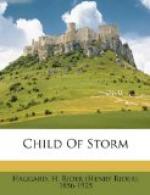“For you, perhaps, Saduko, but not for me who am poor and want cows. Also,” he added, glancing at him shrewdly, “are you so sure that Mameena loves you though you be such a fine man? Now, I should have thought that whatever her eyes may say, her heart loves no one but herself, and that in the end she will follow her heart and not her eyes. Mameena the beautiful does not seek to be a poor man’s wife and do all the hoeing. But bring me the hundred cattle and we will see, for, speaking truth from my heart, if you were a big chief there is no one I should like better as a son-in-law, unless it were Macumazahn here,” he said, digging me in the ribs with his elbow, “who would lift up my House on his white back.”
Now, at this speech Saduko shifted his feet uneasily; it seemed to me as though he felt there was truth in Umbezi’s estimate of his daughter’s character. But he only said:
“Cattle can be acquired.”
“Or stolen,” suggested Umbezi.
“Or taken in war,” corrected Saduko. “When I have a hundred head I will hold you to your word, O father of Mameena.”
“And then what would you live on, fool, if you gave all your beasts to me? There, there, cease talking wind. Before you have a hundred head of cattle Mameena will have six children who will not call you father. Ah, don’t you like that? Are you going away?”
“Yes, I am going,” he answered, with a flash of his quiet eyes; “only then let the man whom they do call father beware of Saduko.”
“Beware of how you talk, young man,” said Umbezi in a grave voice. “Would you travel your father’s road? I hope not, for I like you well; but such words are apt to be remembered.”
Saduko walked away as though he did not hear.
“Who is he?” I asked.
“One of high blood,” answered Umbezi shortly. “He might be a chief to-day had not his father been a plotter and a wizard. Dingaan smelt him out”—and he made a sideways motion with his hand that among the Zulus means much. “Yes, they were killed, almost every one; the chief, his wives, his children and his headmen—every one except Chosa his brother and his son Saduko, whom Zikali the dwarf, the Smeller-out-of-evil-doers, the Ancient, who was old before Senzangakona became a father of kings, hid him. There, that is an evil tale to talk of,” and he shivered. “Come, White Man, and doctor that old Cow of mine, or she will give me no peace for months.”
So I went to see the Worn-out-Old-Cow—not because I had any particular interest in her, for, to tell the truth, she was a very disagreeable and antique person, the cast-off wife of some chief whom at an unknown date in the past the astute Umbezi had married from motives of policy—but because I hoped to hear more of Miss Mameena, in whom I had become interested.
Entering a large hut, I found the lady so impolitely named “the Old Cow” in a parlous state. There she lay upon the floor, an unpleasant object because of the blood that had escaped from her wound, surrounded by a crowd of other women and of children. At regular intervals she announced that she was dying, and emitted a fearful yell, whereupon all the audience yelled also; in short, the place was a perfect pandemonium.




